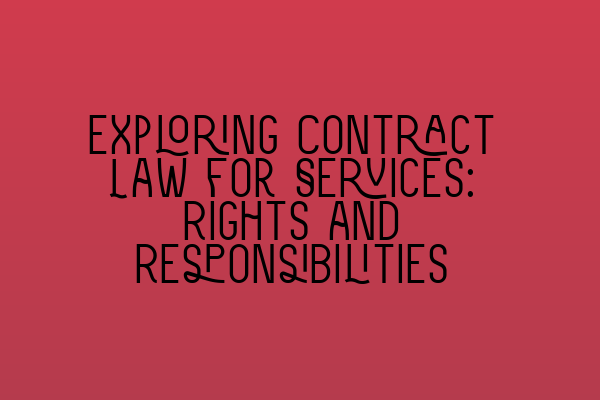Exploring Contract Law for Services: Rights and Responsibilities
In the world of business, contracts play a crucial role in outlining the terms and conditions of agreements between parties involved. Contract law governs these agreements and ensures that all parties fulfill their rights and responsibilities. Understanding the legal aspects of contract law is essential for both service providers and recipients to protect their interests and maintain successful business relationships. In this article, we will explore the rights and responsibilities involved in contract law for services.
Before diving into the specifics, let’s define what contract law encompasses. Contract law refers to the body of law that governs the creation, interpretation, and enforcement of contracts. Contracts are legally binding agreements that establish obligations between parties. These obligations can relate to the provision of goods, services, or both.
Rights in Contract Law for Services
When entering into a contract for services, both the service provider and the recipient have certain rights. These rights serve as protections and entitlements to ensure that the contract is executed as agreed upon. Let’s examine some key rights that each party possesses:
1. Right to Performance: The recipient of the services has the right to demand the agreed-upon performance from the service provider. This includes receiving the services in the manner and timeframe specified in the contract.
2. Right to Payment: The service provider has the right to receive payment for the services rendered. The contract should outline the agreed-upon payment structure, such as fixed fees, hourly rates, or milestone-based payments.
3. Right to Termination: In certain circumstances, both parties have the right to terminate the contract. Termination may occur due to a breach of contract, mutual agreement, or other specified conditions. It is important to include termination clauses in contracts to address these situations.
4. Right to Legal Remedies: If a party breaches the contract, the aggrieved party has the right to seek legal remedies. This may include claiming damages, specific performance, or other forms of relief to rectify the breach.
Responsibilities in Contract Law for Services
Alongside rights, parties involved in a contract for services also have specific responsibilities. These responsibilities outline the obligations and duties each party must fulfill to ensure the contract is properly executed. Let’s examine some key responsibilities:
1. Duty to Perform: The service provider has the responsibility to perform the contracted services to the best of their ability. This includes meeting the agreed-upon standards of quality, timeliness, and professionalism.
2. Duty to Pay: The recipient of the services has the responsibility to make payment according to the agreed terms. Prompt and full payment is essential to maintain a fair business relationship and avoid any potential disputes.
3. Duty of Care: Both parties have a responsibility to exercise reasonable care in fulfilling their obligations. This includes taking necessary precautions to prevent any harm or damage to the other party.
4. Duty of Confidentiality: In certain cases, the parties involved may have access to sensitive information. It is the responsibility of both parties to maintain confidentiality and protect any confidential or proprietary information disclosed during the course of the contract.
5. Duty to Mitigate Damages: In the event of a breach of contract, the non-breaching party has the responsibility to mitigate damages. This means taking reasonable steps to minimize the losses suffered as a result of the breach.
Conclusion
Contract law for services is a vital aspect of business transactions. It ensures that both service providers and recipients understand their rights and responsibilities. By clearly outlining the terms and conditions in a contract, parties can avoid potential disputes and maintain a mutually beneficial relationship.
To deepen your understanding of contract law, you may find the following articles helpful:
– Exploring the Impact of Frustration on Contractual Obligations: Legal Insights
– Interpreting Contractual Clauses: Unlocking the Hidden Meanings
– Legal Aspects of Business Contracts: Key Considerations for Entrepreneurs
– Agreements in Contract Law: Understanding Its Various Types
– Essentials of Consideration: Understanding the Basis of Contractual Exchange
By staying informed about contract law and seeking legal advice when necessary, you can ensure that your contracts are robust, fair, and protect your interests. Remember, a well-drafted and well-understood contract serves as the foundation for successful business relationships.
